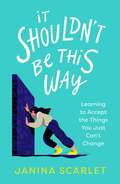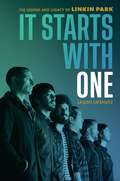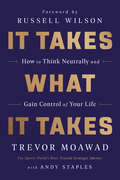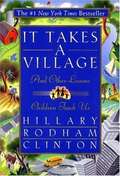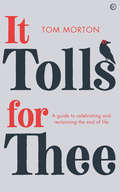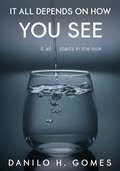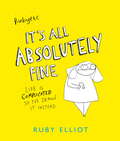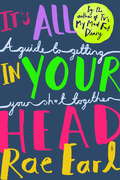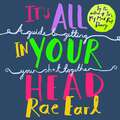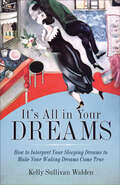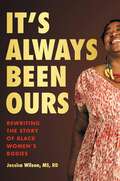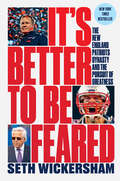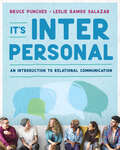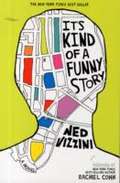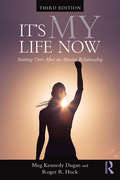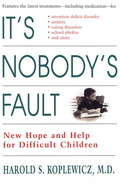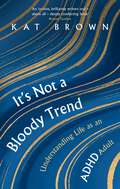- Table View
- List View
It Shouldn't Be This Way: Learning to Accept the Things You Just Can't Change
by Janina ScarletEvery life-changing experience, be it the loss of a function, a job or a friendship, or the death of a loved one, can be excruciating. Illness can forever alter our life and our abilities. And what makes it even more challenging is that many other people might fail to understand how challenging our adjustment to "normalcy" might be. Because there is no "normal" in these experiences. How can there be?When people hear the word acceptance, they might assume that it means being OK with what happened in the past or with how things currently are. In fact, there is a difference between acceptance and "feeling good" about what happened - acceptance means allowing yourself to feel whatever emotions naturally come up in response to what you are going through. It means acknowledging the reality of the pain, even though in an ideal world, it shouldn't be that way.This therapeutic and comforting self-help guide will help you:· Give yourself the permission to grieve or process events in the way that makes sense to you· To fully experience and accept your feelings of anger, grief, frustration or anxiety· To own your truth, even if it makes others uncomfortableThis essential book will teach you to understand and be able to accept the difficult moments and circumstances in your life and make room for how you feel about them. And with this kind of an acceptance, there can be healing.
It Starts with One: The Legend and Legacy of Linkin Park
by Jason LipshutzFrom the executive director of music at Billboard, an extensive look inside the 20+ year career of mega-selling rock band Linkin Park, featuring new interviews, exclusive quotes, and insights from the band&’s associates and collaborators Linkin Park is one of the 21st Century&’s biggest, and most important, rock bands. All it takes is one quick glance at the numbers— 11 Top 40 hits on the Hot 100 and six No. 1 albums on the Billboard 200, over a dozen massive tours, 27 major award wins, 100+ million records sold worldwide, over 30 million monthly Spotify listeners —to realize that when it comes to the metrics of music consumption and fandom, there&’s no bigger group in recent memory. And yet, despite their enduring legacy within rock, there&’s never been a full, comprehensive biography of Linkin Park—until now. In IT STARTS WITH ONE: The Legend and Legacy of Linkin Park, Billboard's executive director of music, Jason Lipshutz, chronicles the innovation and influence of this legendary band, from their early childhoods to the moment their paths crossed to the genesis of their iconic first album, Hybrid Theory, and all that followed. Not only were they able to synthesize trends in pop and hip-hop amidst the post-grunge era and nu metal boom, then constantly reinvent their sound over multiple albums, Linkin Park&’s radically vulnerable lyrics also helped usher in a new era of artists (and fans) more open to discussing mental health and prioritizing inclusivity. Led by their front men, Chester Bennington and Mike Shinoda, who balanced each other out artistically, Linkin Park never shied away from songs that put their issues front and center, for the world to see and feel. Tragically, Chester succumbed to his demons and passed away in 2017, but the music endures—and in order to truly appreciate the band&’s singular power to bring people together, we need to take a closer look at how exactly Linkin Park changed popular music. Through in-depth reporting and interviews, as well as new reflections from their collaborators and contemporaries, IT STARTS WITH ONE explores how one band made such a big impact on modern music, effectively cementing Linkin Park&’s long overdue place in music history.
It Takes One to Tango: How I Rescued My Marriage with (Almost) No Help from My Spouse—and How You Can, Too
by Winifred M. ReillyWith a focus on self-empowerment and resilience, this refreshing and witty relationship guide has a reassuring counterintuitive message for unhappy spouses: you only need one partner to initiate far-reaching positive change in a marriage.Conventional wisdom says that &“it takes two&” to turn a troubled marriage around and that both partners must have a shared commitment to change. So when couples can&’t agree on how—or whether—to make their marriage better, many give up or settle for a less-than-satisfying marriage (or think the only way out is divorce). Fortunately, there is an alternative. &“What distinguishes Reilly&’s book is that she says a warring couple don&’t have to agree on the goal of staying together; it takes one person changing, not both, to make a marriage work&” (The New York Times). Marriage and family therapist Winifred Reilly has this message for struggling partners: Take the lead. Doing so is effective—and powerful. Through Reilly&’s own story of reclaiming her now nearly forty-year marriage, along with anecdotes from many clients she&’s worked with, you&’ll learn how to: -Focus on your own behaviors and change them in ways that make you feel good about yourself and your marriage -Take a firm stand for what truly matters to you without arguing, cajoling, or resorting to threats -Identify the &“big picture&” issues at the basis of your repetitive fights—and learn how to unhook from them -Be less reactive, especially in the face of your spouse&’s provocations -Develop the strength and stamina to be the sole agent of change Combining psychological theory, practical advice, and personal narrative, It Takes One to Tango is a &“wise and uplifting&” (Dr. Ellyn Bader, Director of The Couples Institute) guide that will empower those who choose to take a bold, proactive approach to creating a loving and lasting marriage.
It Takes What It Takes: How to Think Neutrally and Gain Control of Your Life
by Trevor Moawad Andy StaplesForeword by Seattle Seahawks quarterback Russell WilsonFrom a top mental conditioning coach—"the world’s best brain trainer” (Sports Illustrated)—who has transformed the lives and careers of elite athletes, business leaders, and military personnel, battle-tested strategies that will give you tools to manage and overcome negativity and achieve any goal.He knows how to win. More, he knows the many ways-subtle, brutal, often self-inflicted-we lose. As the most trusted mental coach in the world of sports, Trevor Moawad has worked with many of the most dominant athletes and the savviest coaches. From Nick Saban and Kirby Smart to Russell Wilson, they all look to Moawad for help finding or keeping or regaining their competitive edge. (As do countless business leaders and members of special forces.) Now, at last, Moawad shares his unique philosophy with the general public. He lays out lessons he's derived from his greatest career successes as well as personal setbacks, the game-changing wisdom he's earned as the go-to whisperer for elite performers on fields of play and among men and women headed to the battlefield. Moawad's motivational approach is elegant but refreshingly simple: He replaces hardwired negativity, the kind of defeatist mindset that's nearly everybody's default, with what he calls "neutral thinking." His own special innovation, it's a nonjudgmental, nonreactive way of coolly assessing problems and analyzing crises, a mode of attack that offers luminous clarity and supreme calm in the critical moments before taking decisive action. Not only can neutral thinking raise your performance level-it can transform your overall life. And it all starts, Moawad says, with letting go. Past failures, past losses-let them go. "The past isn't predictive. If you can absorb and embrace that belief, everything changes. You'll instantly feel more calm. And the athlete-or employee or parent or spouse-who's more calm is also more aware, and more times than not ... will win."
It Takes a Village and Other Lessons Children Teach Us
by Hillary Rodham ClintonImproving how our nation raises its children
It Tolls For Thee: A guide to celebrating and reclaiming the end of life
by Tom MortonA funeral celebrant's story about how celebrating death, and creating personalised space for grief, can enrich lives and give meaning to death.After a close encounter with death, Tom Morton realised he needed a change of pace and perspective. He decided to become the only independent funeral celebrant on the remote Shetland Islands, an unusual new profession that would lead him on an extraordinary journey into the world of the dead. In a vivid narrative that reveals the fascinating realm of the unspoken - from extraordinary undertakers and death cafés, to pilgrimages and taboos - Tom quickly learns that death and speaking for the dead requires you to think on your feet and often take a magpie approach to faith and philosophy. From Humanism to hymns, Theravada Buddhism to Star Wars theology, he discovers the importance of ritual, humour, and the empowering act of trying to find words for something beyond language itself.This is an accessible and thought-provoking guide to celebrating mortality. When grief must be an inevitable part of life, Tom shows how we can mourn together in a way that feels appropriate to the life of the one who has passed on, and ultimately cultivate a healthy attitude to our own eventual demise.
It all depends on how you see: It all starts in the look
by Ana Cristina Rodrigues Gomes Danilo Henrique GomesIn "It all depends on how you see", the author brings a different way of seeing the world and the problems of everyday life. Based on theology and phenomenology, a famous line of philosophical thought, the reader can reprogram his mind to enjoy life in an uncomplicated way. Find in this book related topics: - Phenomenology (line of thought of philosophy) - To the power of optimism and pessimism - Cognitivism (line of thought of psychology) - To the power of conviction - The subjectivity - The right way to see the world And much more! The old thoughts and theories of scientists such as William James, Edmund Husserl, Jean-Paul Sartre, and others are analysed in a well-explained and somehow funny way, and the way in which they are applied in everyday life is set forth in the pages of this work. Your gaze commands your way of living life and it can be modified, so immerse yourself in this book and change your way of seeing the world.
It's All Absolutely Fine: Life is complicated, so I've drawn it instead
by Ruby ElliotIT'S ALL ABSOLUTELY FINE is a darkly comic, honest and unapologetic account of daily struggles with mental health and what it's like trying to be a person when you feel like a potato. This book walks readers through the ups, downs and sideways of life, illuminating very real problems, all with Ruby's trademark originality and humour. It's an empowering book that will make you think, make you laugh, and make things that little bit more ok.
It's All In Your Head: A Guide to Getting Your Sh*t Together
by Rae Earl"A warm hug of a book ... a true gem" BuzzfeedThis witty, honest and enlightening guide to the whirrings of your brain is the perfect read for any young person who's ever felt overwhelmed, at a loss or in a downward spiral. From the author of My Mad Fat Diary, Rae Earl, it's full of friendly advice, coping strategies and laugh-out-loud moments to get you through the difficult days. Most of all, this is a book from someone who gets it - someone who won't try and fob you off with confusing jargon or irritating slogans, but instead will help you through it with a smile and a cup of tea on hand.Rae says: As a teenager, I was very adept at hiding my OCD, my anxiety, my depression and my eating disorders. That's why I've written this book - because I hate to think of any teen going through what I did, and feeling like they can't talk about it, or need to hide it. So let's break down some taboos and start a conversation. I want to help you come out the other side feeling happier and healthier, with a deeper understanding of what's going on in your head and how to navigate through life without feeling overwhelmed or isolated. Where my lack of medical background becomes an issue, Dr Radha swoops in to the rescue. As a GP, mental-health expert and co-host of BBC Radio 1's The Surgery, I've worked with her to make sure all the information and advice is spot-on. She's clever, she's kind and she GETS it. I wish my teenage brain had had access to Dr Radha.This is a book for fans of Gemma Cairney and Open, Ruby Wax and Frazzled, Matt Haig and Reasons to Stay Alive, Bryony Gordon and Mad Girl. And most importantly, it's a book to make you feel like you're not alone. You're really, really not.
It's All In Your Head: A Guide to Getting Your Sh*t Together
by Rae EarlIt's All in Your Head is a comprehensive, positive and wise guide to mental health - a subject that directly affects 1 in 4 of us each year, and indirectly affects millions more. Non-reverential and darkly funny, the book aims to take mental health discussions out of the margin and make them mainstream and accessible. Rae Earl, author of My Mad Fat Diary, writes about her own experiences and speaks to teens and young people about theirs. Dr Radha, a GP, mental health expert and co-host of BBC Radio 1's The Surgery acts a consultant, ensuring all advice given is targeted, pitched correctly and medically sound. The result is a warm, readable book that will help teens cope and live with a mental health condition, rather than suffer from one.(P) Wren & Rook 2017
It's All in Your Dreams: How to Interpret Your Sleeping Dreams to Make Your Waking Dreams Come True
by Kelly Sullivan WaldenUse Your Dreams to Change Your LifeWhat are our dreams trying to tell us? What can they teach us? With the help of dream analyst and media personality Kelly Sullivan Walden, you can learn how to remember and use your dreams to craft the waking life you desire.Explore the larger story of your life. Dreams are a magical realm we can enter into every night. They hold within them stories and experiences that can change us and reveal to us truths about ourselves. When we enter into the dream space, anything is possible—we can learn a topic of fascination, study at the feet of a master, converse with a departed loved one, or find an answer to a perplexing question. Dream analysis opens the door for an opportunity to dive deeper into ourselves and tap into a source for both healing and growth.Learn about the 5-Step Process. As a certified clinical hypnotherapist and dream analyst, author Kelly Sullivan Walden shares with readers her expertise on the topic of dreams and explains how to effectively use your dreams to change your life. Her five-step process (Declaration, Remembrance, Embodiment, Activation, Mastermind) offers a detailed guide for dream interpretation and will teach readers how to become fluent in the language of dreams. If you’ve ever asked, "what do dreams mean?" or "what is my dream trying to tell me?", by the end of this book you’ll have all you need to answer those questions. Dive into this book by dream expert Kelly Sullivan Walden and learn how to:Decipher dream meaningsImplement Walden’s 5-step process to master your dreamsUse your dreams to make your life betterReaders of books such as The Dream Interpretation Handbook, A Little Bit of Dreams, Way of the Peaceful Warrior, or Why We Sleep will enjoy Kelly Sullivan Walden's It’s All in Your Dreams.
It's Always Been Ours: Rewriting the Story of Black Women's Bodies
by Jessica Wilson MS, RDWE WILL REWRITE THE NARARTIVE OF BLACKNESS THAT CENTERS AND CELEBRATES OUR JOY. In It&’s Always Been Ours eating disorder specialist and storyteller Jessica Wilson challenges us to rethink what having a "good" body means in contemporary society. By centering the bodies of Black women in her cultural discussions of body image, food, health, and wellness, Wilson argues that we can interrogate white supremacy&’s hold on us and reimagine the ways we think about, discuss, and tend to our bodies. A narrative that spans the year of racial reckoning (that wasn't), It&’s Always Been Ours is an incisive blend of historical documents, contemporary writing, and narratives of clients, friends, and celebrities that examines the politics of body liberation. Wilson argues that our culture&’s fixation on thin, white women reinscribes racist ideas about Black women's bodies and ways of being in the world as "too much." For Wilson, this white supremacist, capitalist undergirding in wellness movements perpetuates a culture of respectability and restriction that force Black women to perform unhealthy forms of resilience and strength at the expense of their physical and psychological needs. With just the right mix of wit, levity, and wisdom, Wilson shows us how a radical reimagining of body narratives is a prerequisite to well-being. It&’s Always Been Ours is a love letter that celebrates Black women&’s bodies and shows us a radical and essential path forward to rediscovering their vulnerability and joy.
It's Better to Be Feared: Inside The New England Patriots Dynasty
by Seth WickershamNOW WITH A NEW EPILOGUE ON THE 2021 SEASON AND TOM BRADY’S BRIEF RETIREMENT NEW YORK TIMES BESTSELLER SPORTS ILLUSTRATED • NONFICTION BOOK OF THE YEAR National Sports Media Association • Book of the Year Kirkus Reviews • Best Nonfiction of the Year “Seth Wickersham has managed to do the impossible: he has pulled off the definitive document of the Belichick/Brady dynasty.” —Bill Simmons, The Ringer The explosive, long-awaited account of the making of the greatest dynasty in football history—from the acclaimed ESPN reporter who has been there from the very beginning. Over two unbelievable decades, the New England Patriots were not only the NFL’s most dominant team, but also—and by far—the most secretive. How did they achieve and sustain greatness—and what were the costs? In It's Better to Be Feared, Seth Wickersham, one of the country’s finest long form and investigative sportswriters, tells the full, behind-the-scenes story of the Patriots, capturing the brilliance, ambition, and vanity that powered and ultimately unraveled them. Based on hundreds of interviews conducted since 2001, Wickersham’s chronicle is packed with revelations, taking us deep into Bill Belichick’s tactical ingenuity and Tom Brady’s unique mentality while also reporting on their divergent paths in 2020, including Brady’s run to the Super Bowl with the Tampa Bay Buccaneers. Raucous, unvarnished, and definitive, It’s Better to Be Feared is an instant classic of American sportswriting in the tradition of Michael Lewis, David Maraniss, and David Halberstam.
It's Interpersonal: An Introduction to Relational Communication (First Edition)
by Bruce Punches Leslie Ramos SalazarStudents will relate Teachers already know that the interpersonal communication course is among the most interesting, relevant, and life-changing courses a student can take. But many texts fail to directly connect the core ideas in the field to students’ own relationships with friends, family, and coworkers. It’s Interpersonal puts students at the center of its approach. Written in a friendly, conversational, and approachable style and filled with relatable examples, pop culture references, and innovative, engaging pedagogy—including InQuizitive, an interactive, adaptive learning tool—It’s Interpersonal motivates students to improve their communication skills and to apply the course’s content to their own lives. This purchase offers access to the digital ebook only.
It's Kind of a Funny Story
by Ned VizziniAt his new school, Craig realizes that he isn't brilliant compared to the others. The stress becomes unbearable and he stops eating until, one night, he nearly kills himself. This suicidal episode gets him checked into a mental hospital.
It's Love, Only Love: Green Mountain Book 5 (Green Mountain)
by Marie ForceFrom New York Times bestselling author Marie Force, creator of the beloved McCarthys of Gansett Island, Quantum and Fatal series, comes the fifth book in her Green Mountain series. Fans of Debbie Macomber, Susan Mallery and Jill Shalvis will love the heartwarming, sexy romance series centered on the lives of the Abbott family. Can her love heal his broken heart? Ella Abbott has long been secretly in love with Gavin Guthrie. She sees that he's in a bad place and that he believes he has nothing to offer her. But one unforgettable kiss gives Ella hope. It's been seven years since Gavin lost his brother. He thought he had his grief under control, until recent painful reminders of his loss sent him spiralling. Gavin knows it wouldn't be fair to drag Ella into his darkness, but being around her soothes his aching heart. And if they can fight his demons together, maybe a future filled with love is possible after all.***Published in the USA as It's Only Love***For more spellbinding Green Mountain romance, check out the whole series: Your Love Is All I Need, Let Me Hold Your Hand, I Saw You Standing There, And I Love You, You'll Be Mine, It's Love, Only Love and Ain't She Sweet.
It's My Life Now: Starting Over After An Abusive Relationship Or Domestic Violence
by Meg Kennedy Dugan Roger R. HockWhile many books tell women how to get out of abusive relationships, until now, no book has addressed the emotional and practical needs of women who have left and are now to rebuild their lives. <P><P> It's My Life Now: Starting Over After an Abusive offers encouragement and practical advice to women who seek to repair their self-esteem, assess their safety, and move on to better lives. Written in reassuring language, this book is a compassionate and comprehensive guide through the healing for survivors and for the people who love them. It's My Life Now offers guidance and support to help women:<P> * Conquer emotional pain, confront feelings of loss, rebuild their self-esteem, and learn to love and trust again.<P> * Master the psychological conflicts of feelings of lingering love the abuser and the temptation to go back.<P> * Deal effectively with the practical considerations of a new life including care for children, financial matters, personal safety, and legal problems. <P> Filled with "self-exploration" exercises and activities for personal growth, It's My Life Now is an invaluable road map for women beginning the difficult, yet rewarding journey toward healing and happiness.
It's My Life Now: Starting Over After an Abusive Relationship
by Meg Kennedy Dugan Roger R. HockNow in its third edition, It’s My Life Now is a guide for survivors who have left an abusive relationship. It addresses—in clear, non-threatening language—various issues associated with abuse and violence, including post-relationship emotions, psychological impact, dealing with children, personal safety, legal problems, and financial security. Each chapter dismantles common myths about being in and leaving an abusive relationship and contains activities for self-exploration that survivors can complete as they navigate a new life free from abuse. Recommended by the National Coalition of Domestic Violence, this book is designed to benefit any survivor, no matter how much time has passed.
It's My Party and I Don't Want to Go
by Amanda PanitchA funny and honest portrayal of living with social anxiety, this timely novel explores the universal themes of growing up and finding your voice, set in a fast-paced comedy.Ellie Katz is sabotaging her own party.Sure, it seems extreme, but it's the only option for her bat mitzvah. Crowds and attention always made her nervous, and lately they've been making it harder and harder for Ellie to breathe. The celebration would mean (1) a large crowd, (2) lots of staring, and (3) distant family listening to her sing in another language. No thank you!To avoid certain catastrophe, she hatches a plan with her best friend Zoe to ruin the big day. Cue the email hacking, DJ takedown, and an all-out food fight! Everything is falling apart according to plan, until a fight with Zoe leaves Ellie alone on her path of destruction, facing some unintended consequences and disappointments. Can she find a way to right her wrongs, face her fears, and light her candles?
It's Nobody's Fault: New Hope and Help for Difficult Children and Their Parents
by Harold S. KoplewiczPeople who wouldn't dream of blaming parents for a child's asthma or diabetes are often quick to blame bad parenting for a child's hyperactivity, depression, or school phobia. The parents, in turn, often blame their children, believing that they're lazy or rebellious. Even worse, the children with these psychological problems often blame themselves, convinced that they're just bad kids. In It's Nobody's Fault, esteemed child and adolescent psychiatrist Dr. Harold S. Kopelwicz at last puts an end to this pointless--and erroneous--cycle of blame and helps parents get the help they need for their troubled children. Written in an easy, anecdotal style and filled with fascinating stories of real children and their parents, It's Nobody's Fault is an indispensable guide for anyone who lives or works with children who need help.
It's Not A Bloody Trend: Understanding Life as an ADHD Adult
by Kat Brown'A sledgehammer of a book putting to bed all the cynicism and misinformation around a condition that affects so many hidden, brilliant people' Professor Tanya Byron'Laugh out loud funny and deeply validating - every person who thinks ADHD isn't real should read this book' Leanne Maskell, author of ADHD: An A to ZNobody should spend their life feeling defective. Everyone deserves to have a user manual to their brain - welcome to yours. Once associated more with hyper boys than adults, ADHD (attention deficit hyperactivity disorder) is now recognised as a condition in need of a rebrand which affects people of all genders and ages in a multitude of ways. In this enlightening and definitive layman's guide, Kat Brown cheerfully smashes the stereotypes with scientific evidence, historical context, and practical support for ADHD minds across areas that can cause problems, from finances and work to self-medicating, relationships, hormones and self-esteem. Based on Kat's personal experience and extensive interviews with ADHDers and world-leading clinical experts, It's Not A Bloody Trend is for anyone wondering if what's always been 'wrong' with them might just be undiagnosed ADHD.
It's Not A Bloody Trend: Understanding Life as an ADHD Adult
by Kat BrownBIONIC TEXT FORMAT ALSO AVAILABLE'A sledgehammer of a book putting to bed all the cynicism and misinformation around a condition that affects so many hidden, brilliant people' Professor Tanya Byron'Laugh out loud funny and deeply validating - every person who thinks ADHD isn't real should read this book' Leanne Maskell, author of ADHD: An A to ZNobody should spend their life feeling defective. Everyone deserves to have a user manual to their brain - welcome to yours. Once associated more with hyper boys than adults, ADHD (attention deficit hyperactivity disorder) is now recognised as a condition in need of a rebrand which affects people of all genders and ages in a multitude of ways. In this enlightening and definitive layman's guide, Kat Brown cheerfully smashes the stereotypes with scientific evidence, historical context, and practical support for ADHD minds across areas that can cause problems, from finances and work to self-medicating, relationships, hormones and self-esteem. Based on Kat's personal experience and extensive interviews with ADHDers and world-leading clinical experts, It's Not A Bloody Trend is for anyone wondering if what's always been 'wrong' with them might just be undiagnosed ADHD.
It's Not A Bloody Trend: Understanding Life as an ADHD Adult
by Kat BrownBIONIC TEXT FORMAT ALSO AVAILABLE'A sledgehammer of a book putting to bed all the cynicism and misinformation around a condition that affects so many hidden, brilliant people' Professor Tanya Byron'Laugh out loud funny and deeply validating - every person who thinks ADHD isn't real should read this book' Leanne Maskell, author of ADHD: An A to ZNobody should spend their life feeling defective. Everyone deserves to have a user manual to their brain - welcome to yours. Once associated more with hyper boys than adults, ADHD (attention deficit hyperactivity disorder) is now recognised as a condition in need of a rebrand which affects people of all genders and ages in a multitude of ways. In this enlightening and definitive layman's guide, Kat Brown cheerfully smashes the stereotypes with scientific evidence, historical context, and practical support for ADHD minds across areas that can cause problems, from finances and work to self-medicating, relationships, hormones and self-esteem. Based on Kat's personal experience and extensive interviews with ADHDers and world-leading clinical experts, It's Not A Bloody Trend is for anyone wondering if what's always been 'wrong' with them might just be undiagnosed ADHD.
It's Not A Bloody Trend: Understanding Life as an ADHD Adult (Bionic Text Edition)
by Kat BrownNobody should spend their life feeling defective. Everyone deserves to have a user manual to their brain - welcome to yours. Once associated more with hyper boys than adults, ADHD (attention deficit hyperactivity disorder) is now recognised as a condition in need of a rebrand which affects people of all genders and ages in a multitude of ways. In this enlightening and definitive layman's guide, Kat Brown cheerfully smashes the stereotypes with scientific evidence, historical context, and practical support for ADHD minds across areas that can cause problems, from finances and work to self-medicating, relationships, hormones and self-esteem. Based on Kat's personal experience and extensive interviews with ADHDers and world-leading clinical experts, It's Not A Bloody Trend is for anyone wondering if what's always been 'wrong' with them might just be undiagnosed ADHD.
It's Not A Bloody Trend: Understanding Life as an ADHD Adult (Bionic Text Edition)
by Kat Brown'A sledgehammer of a book putting to bed all the cynicism and misinformation around a condition that affects so many hidden, brilliant people' Professor Tanya Byron'Laugh out loud funny and deeply validating - every person who thinks ADHD isn't real should read this book' Leanne Maskell, author of ADHD: An A to ZNobody should spend their life feeling defective. Everyone deserves to have a user manual to their brain - welcome to yours. Once associated more with hyper boys than adults, ADHD (attention deficit hyperactivity disorder) is now recognised as a condition in need of a rebrand which affects people of all genders and ages in a multitude of ways. In this enlightening and definitive layman's guide, Kat Brown cheerfully smashes the stereotypes with scientific evidence, historical context, and practical support for ADHD minds across areas that can cause problems, from finances and work to self-medicating, relationships, hormones and self-esteem. Based on Kat's personal experience and extensive interviews with ADHDers and world-leading clinical experts, It's Not A Bloody Trend is for anyone wondering if what's always been 'wrong' with them might just be undiagnosed ADHD.
